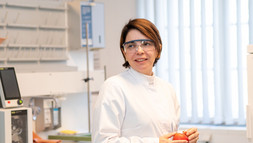Research
Our society is undergoing a transformation, evolving to ensure its future viability.
The dramatic changes to our living conditions, the immense loss of biodiversity, and the climate crisis highlight the importance of addressing questions related to sustainable development.
At the School of Sustainability—the first of its kind in Germany, established in 2010—the transformation and development processes towards a sustainable society are explored, and solutions to current social and ecological challenges are developed. The aim is to create a more sustainable future.
This is achieved with an awareness that traditional disciplinary boundaries must be transcended. Solutions can only be developed and implemented effectively through inter- and transdisciplinary approaches. For this reason, sustainability resonates across all five Schools for Research at Leuphana University Lüneburg. Leuphana’s sustainability research contributes to answering pressing questions at local, regional, and international levels.
Its sustainability research profile focuses on areas including Sustainability Management, Entrepreneurship, Agency and Leadership, Ecosystems, Biodiversity and Social-Ecological Systems, Governance and Law, and Resources, Materials, and Chemistry.
During the reporting period, researchers at Leuphana are investigating topics such as:
- Participatory and place-based past, present and future ecosystem restoration in Rwanda. The ecological, social and socio-ecological consequences of restoration activities are examined, including the mechanisms that lead to different outcomes in the restoration of these systems. The resulting interdisciplinary systems approach to ecosystem restoration will ultimately advance restoration science and practice worldwide and address biodiversity loss, degradation and climate change. (A socio-ecological systems approach to ecosystem restoration in rural regions of Africa, Fischer, 2023-2027)
- The development of more sustainable and environmentally friendly active ingredients for medicines that reduce the ecological footprint and dependence on third countries for production. The result will be a more independent and competitive European pharmaceutical industry that can ensure the timely availability of sustainable and environmentally friendly therapeutics for its citizens. (TransPharm: Transformation to a sustainable European pharmaceutical sector, Kümmerer, Olsson, 2022-2026)
- Land use strategies and decision-making processes that achieve climate, biodiversity, and human well-being. The project also includes interventions that leverage political, economic, social, material, and cultural contexts to achieve these strategies. To this end, the researchers are bringing together 23 institutions from across Europe. (PLUS Change - participatory land use strategies: meeting biodiversity, climate and social objectives in a changing world, Newig, 2023-2027)
- The qualification of climate managers who accelerate the climate adaptation process at the local level and create synergies with climate protection. The master's program “Sustainability Science” provides students with practical training for careers as municipal climate managers. (SudiKommKlima: Study path for a career as a municipal climate manager, Hörisch, Möller, 2022-2025)
- How small and medium-sized enterprises (SMEs) can develop sustainable business models and practices (such as social entrepreneurship, non-profit enterprises, cooperatives, and carbon-neutral businesses). (TRANSFORM: Accelerating experiments for sustainable entrepreneurship in local areas, Lang, Schaltegger, 2018-2025)
- Social innovations in the Lüneburg region and the Hamburg metropolitan area. Social innovations are innovations in products, processes, or organizational forms that are developed in exchange with social actors to solve societal challenges such as climate change or new forms of mobility and work. (Community “Social Innovation and Entrepreneurship” (Hoyer, Wenzel, Reihlen, Farny, Cnossen, Hörisch, Weisenfeld), 2023-2027)
Further Leuphana research projects on sustainability can be found in the “Research News” section below.




